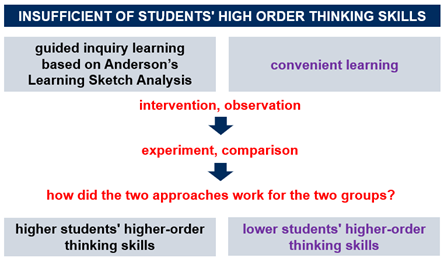Abstract
The 21st century learning process focuses on enhancing higher-order thinking skills (HOTs). In Indonesian schools, students’ HOTs in the reaction rate topic need improvement. This study investigates the effectiveness of guided inquiry learning based on Anderson’s learning sketch analysis in enhancing HOTs. Involving 60 of 11th grade science students from a public high school in Malang, the study used a quasi-experimental design with an experimental class (Anderson’s learning sketch) and a control class (conventional learning). The research instrument was a HOTs assessment with 10 essay questions. Data analysis using an independent sample t-test showed a significant difference (p = 0.002), with the experimental class scoring higher (69.3) than the control class (49.9). The findings indicate that Anderson’s Learning Sketch Analysis is effective in improving students’ HOTs, with the experimental class outperforming the control class in skills such as analysis (63% vs. 39%), evaluation (71% vs. 55%), and creation (78% vs. 70%). These results highlight the importance of guided inquiry in enhancing HOTs.
References
Anderson, L. W.; Krathwohl, D. R.; Aaiasian, P. W.; Cruicksank, K. A.; Mayer, R. E.; Pinrich, P.R.; Raths, J.; Wittrock, M. C. A Revision of Bloom’s Taxonomyof Educational Objectives. Longman, 2001.
George, D.; Mallery, P. IBM SPSS Statistics 23 Step by Step. Routledge, 2016.
Habiddin, H.; Page, E. M. Measuring Indonesian Chemistry Students' Higher Order Thinking Skills (HOTS) in Solving Chemical Kinetics Questions Measuring Indonesian Chemistry Students' Higher Order Thinking Skills (HOTS in Solving Chemical Kinetics Questions. In: Empowering Science and Mathematics for Global Competitiveness. Taylor & Francis Group, 2019, 215–225. https://doi.org/10.1201/9780429461903-32
Herunata, H.; Ratnasari, N. E.; Widarti, H. R.; Sulistina, O. Development of HOTs-Oriented Reaction Rate Teaching Materials Based on Anderson’s Learning Sketch Analysis). In: SNKP 2021. Malang, 2021, pp 63–70.
Kemdikbud, R. I. Permendikbud RI 37/2018. Kemdikbud RI, 2018.
Mawardi, M. A. F.; Rusiani, F. Y. Effectiveness of Student Worksheets Based Guided Inquiry on Acid Base Material to Improve Students Higher Order Thinking Skill (HOTS) Effectiveness of Student Worksheets Based Guided Inquiry on Acid Base Material to Improve Students Higher Order Thinkin. J. Phys. IOP Conf. Ser. 2020, 1481, 012083. https://doi.org/10.1088/1742-6596/1481/1/012083
Net, A.; Smith, J.; Johnson, R. Development of Science Worksheets Oriented Toward Higher-Order Thinking Skills Through Inquiry-Based Learning. J. Sci. Educ. Technol. 2024, 33 (2), 145–162. https://doi.org/10.1007/s10956-024-10001-2
Nzomo, C.; Rugano, P.; Njoroge, J. Heliyon Inquiry-Based Learning and Students' Self-Efficacy in Chemistry among Secondary Schools in Kenya. Heliyon. 2023, 9 (1), e12672. https://doi.org/10.1016/j.heliyon.2022.e12672
Prahani, B. K.; Limatahu, I.; Yuanita, L.; Nur, M. Effectiveness Of Physics Learning Material Through Guided Inquiry Model to Im[Prove Student’s Problem Solving. Int. J. Educ. Res. 2016, 4 (12), 231–242.

This work is licensed under a Creative Commons Attribution 4.0 International License.
Copyright (c) 2025 Eclética Química





